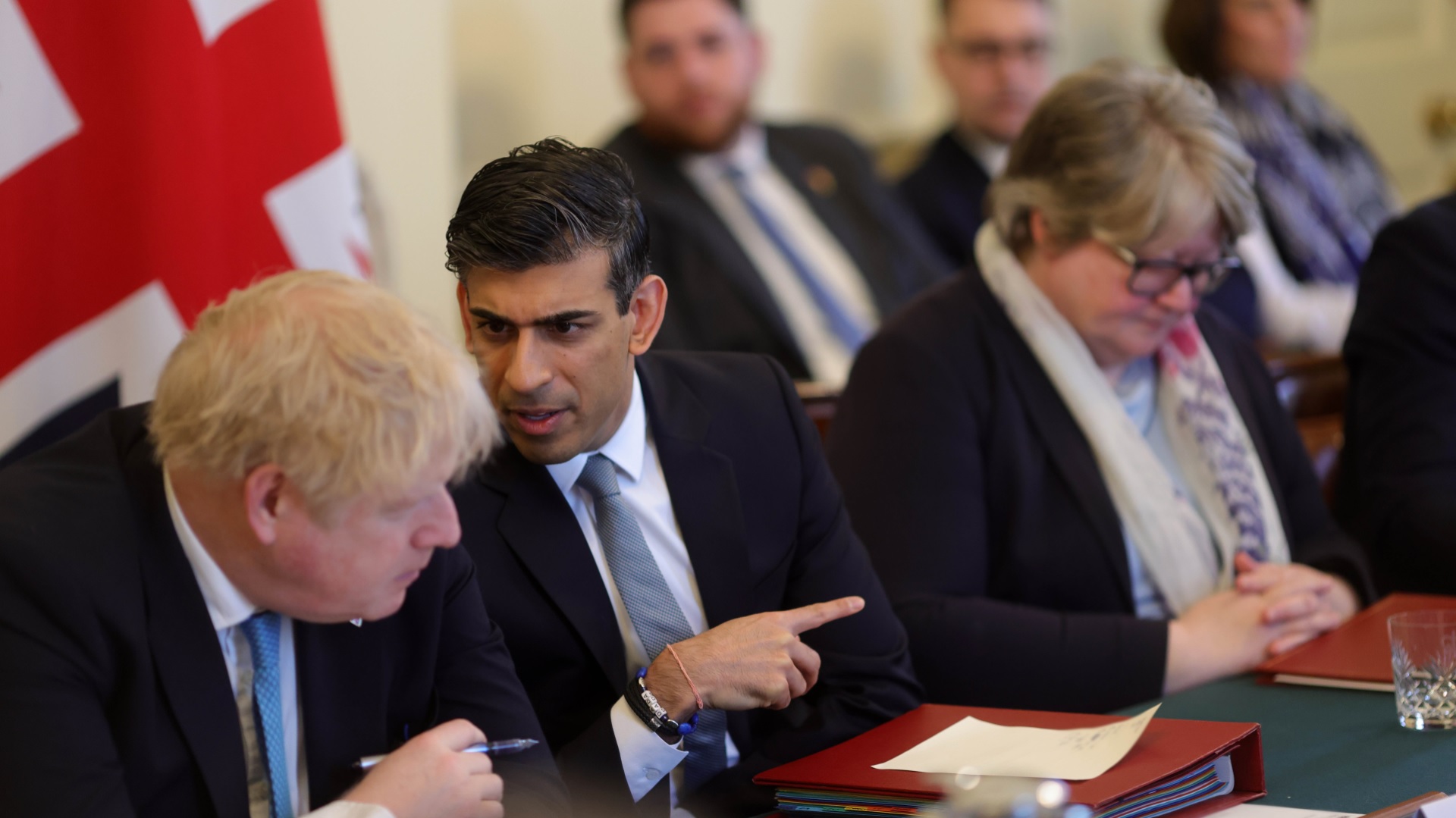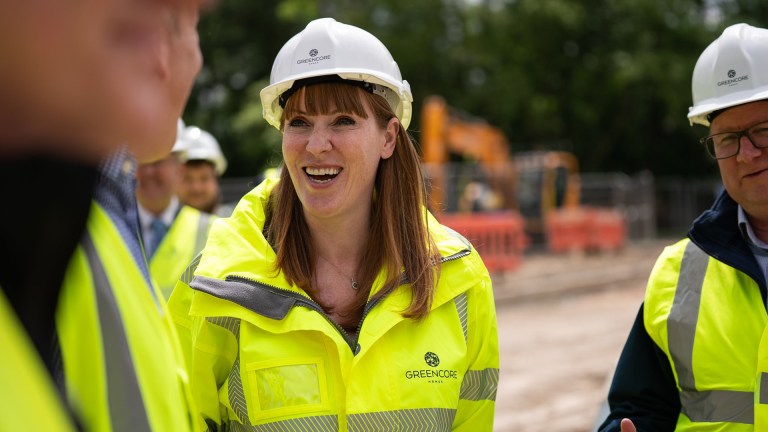The Department for Levelling Up, Housing and Communities has the lead brief but it takes the Department of Health and Social Care to treat greater health needs of people experiencing homelessness and the Ministry of Justice to ensure prisoners are not released into homelessness.
The Treasury and the Department for Work and Pensions are responsible for ensuring households have a financial safety net to prevent homelessness. The Home Office also has a role to play.
But the prospect of ending rough sleeping still seems far away.
It was housing secretary in 2019, Robert Jenrick, who convinced then-incoming prime minister Boris Johnson to include the target to end rough sleeping in the Tories’ manifesto ahead of the election. Jenrick admitted to The Big Issue last year that the party had “got it wrong” on rough sleeping in the previous decade as austerity drove people to the streets.
Given the position at the time, it was an incredibly ambitious target – and that earned the respect of homelessness experts.
Dr Andrew Connell, policy manager at The Salvation Army, told The Big Issue: “It’s absolutely fantastic that the UK government came out and said this, let’s be perfectly clear about this. It’s a very ambitious statement but absolutely all credit to them for saying that.”
Advertising helps fund Big Issue’s mission to end poverty
It’s a sentiment shared by Alexia Murphy, chief executive of youth homelessness charity, Depaul UK.
“I won’t diss what the government has done in the last five years, I think there’s been some amazing achievements,” she said.
But, ultimately, the Tories fell well short of their target and there is little sign of falling homelessness, going into the next general election.
The Big Issue has asked homelessness experts, academics, charities and politicians to look back at the missed opportunities and the failures that stopped people living on the streets for good.
The government didn’t capitalise on the Everyone In scheme
One of the true ironies of Covid is that while the pandemic changed the world as we know it, it also offered a golden opportunity to end street homelessness for good, perhaps a better opportunity than any government could have hoped for.
The Everyone In scheme was a directive from the government to ask councils to bring in everyone out on the streets or at risk of sleeping rough to protect them from the spread of Covid-19.
Advertising helps fund Big Issue’s mission to end poverty
Around 37,000 people were supported through the scheme, which mobilised local authorities, homelessness charities and support services to move people into hotels and other emergency accommodation left empty due to lockdowns.
As far as everyone The Big Issue spoke to is concerned, it was an almost unimaginable triumph.
Speaking to the Big Issue in October 2023, Centrepoint’s head of policy, research and campaigns Alicia Walker said: “Everyone In was fantastic. It was such a great policy. And it showed that it was possible that we can end rough sleeping and it showed that the government was on track to meet its target.
“But it happened in the context of a pressing and very obvious concern that touched on all of society and the government had to respond immediately. They’ve not so much rowed back since then but I’d say they have dropped the ball.”
Depaul’s Murphy added: “Everyone In was a great success. Without a doubt, it was an incredible example of what can be achieved and everyone works together. But it was for a crisis. People are homeless, they’re not hotel-less. And hotels don’t make homes.”
Everyone In was a crisis intervention at a time of emergency. It saw the government remove structural and systemic barriers, such as providing shelter to asylum seekers and migrants, that have since been put back in place.
Advertising helps fund Big Issue’s mission to end poverty
Osama Bhutta, director of campaigns at Shelter, said: “It’s outrageous that the government is at risk of missing its rough sleeping target because of its own inaction. It could have built on its progress as we came out of the pandemic but instead has left more people to end up on the streets.”
Renters have not been protected from homelessness
The Renters Reform Bill was supposed to make it through parliament to axe no-fault evictions and offer greater protection to renters.
Instead, thousands of renters have received eviction notices over the last five years without landlords being required to give them a reason.
No-fault evictions, also known as Section 21 evictions, are a leading driver of homelessness and the failure to remove them from the statute book has proven to be at odds with the goal of tackling rough sleeping.
Low-income renters have become increasingly vulnerable in the last four years due to local housing allowance (LHA) rates.
Almost all the experts The Big Issue spoke to cited the failure to increase LHA rates as a major factor in rising homelessness.
Advertising helps fund Big Issue’s mission to end poverty
LHA rates are intended to ensure housing benefits which help low-income tenants cover rents for the bottom-30% of rented homes on the market.
But rates were frozen between 2020 and 2024 and left renters facing increasing housing costs and insufficient income to keep up.
It also left tenants with few choices if they need to move home and made it difficult for organisations supporting rough sleepers to find them a permanent home in the private rented sector once they have been helped off the streets.
That’s why chancellor Jeremy Hunt announced LHA would rise in April 2024, although it is slated to be frozen once again from 2025 onwards.
Speaking before that rise, Dr Andrew Connell, policy manager at The Salvation Army, said: “It seems that if you’ve if you’ve got one part of government saying we need to end street homelessness, and then you’ve got another part of government – the DWP or the Treasury saying, ‘Actually, we’re going to do something that makes the private rented sector, less accessible and less affordable.’
“Those two objectives are not aligned to each other. It’s completely out of kilter now with actual rents in the private rented sector.”
Advertising helps fund Big Issue’s mission to end poverty
The Big Issue’s blueprint for change is calling on the next government to scrap no-fault evictions and to unfreeze local housing allowance rates going forward.
Removing the £20 universal credit uplift
The disruption of the pandemic saw hundreds of thousands of people turn to universal credit to get through and the government increased payments by £20 a week.
The £20 uplift lasted until October 2021, reducing the amount people on a low income receive before the cost of living crisis started to bite.
Universal credit has long been accused of failing to keep up with living costs. The average gap between benefit payments and the actual cost of covering the basics is £35 a week for a single person, the IPPR recently reported.
The problem is particularly acute for people under the age of 25 who are entitled to less than four-fifths of the award that someone over 25.
Centrepoint’s Walker said: “We’re in the worst inflation crisis in decades. We’ve got the cost of living crisis, we’ve got all of these problems, but we’re sort of doing the opposite of Everyone In. The reversal of the £20 uplift has a huge impact on young people especially.
Advertising helps fund Big Issue’s mission to end poverty
“The reverse of that uplift in the context of emerging from a crisis into a financial crisis means that more people were made homeless. The crisis emerging from the pandemic is so much worse economically but the support just is not there for homeless people. And neither is the willpower to do anything about it.”
Has the political will to end rough sleeping been there?
With delivering Brexit and the levelling up agenda the big issues back in 2019 and Covid swiftly taking over in 2020 before the cost of living crisis followed, tackling homelessness has never been top of the Tory agenda throughout the last four years.
Add in the fact the government of today is very different to when Johnson took charge in 2019 and the constant upheaval and chopping and changing among housing and rough sleeping ministers hasn’t helped matters.
Between 2010 and 2024 there were 16 housing ministers with an average of less than a year in charge.
Centrepoint’s Walker said political will was one of the reasons why the government had fallen short of hitting its target.
“The problem is that it’s not the top priority for the department, homelessness, rough sleeping especially, it’s just not the top priority,” said Walker. “There are so many things that come before it. And so when it comes to the fact that ending homelessness has to be a cross-departmental piece, no one department is really owning it and taking it forward as a priority. And that is a problem.
Advertising helps fund Big Issue’s mission to end poverty
“The political mess means that vulnerable people as a whole are always going to fall through the cracks. But homeless people are definitely going to fall through the cracks.”
It’s impossible to tackle homelessness without homes
The housing crisis is nothing new – successive governments have failed to build enough homes to keep up with the UK’s rising population.
It’s an issue that is at the core of sky-high house prices and rents – both of which hit record-highs over the last five years.
The government set a manifesto target of building 300,000 homes per year by the mid-2020s and it has managed to deliver more homes than recent Westminster regimes with a peak of around 235,000 in 2022-23.
The trouble is that very few of these homes were for social rent – the most affordable housing tenure.
Shelter and the National Housing Federation estimate that 90,000 social rent homes are needed each year. The Big Issue’s blueprint for change is calling on the next government to build more social and affordable housing while it is in power.
Advertising helps fund Big Issue’s mission to end poverty
And the number of homes needed goes up every year in which not enough are built.
Centre for Cities estimates that Britain needs to build 442,000 homes over 25 years to bridge the gap. Compared to European countries, it is missing 4.3 million homes with the think tank pointing the finger at restrictive planning rules.
Jimmy’s chief executive Mark Allan said: “While renting and buying is expensive and accessing social housing is almost impossible, people are going to end up homeless. Unless there is a plan to build lots of genuinely affordable housing and bring down the cost of buying and renting genuinely, then people will continue to end up homeless.”
As Osama Bhutta, director of campaigns at Shelter, put it: “The only way to end homelessness for good is to build a new generation of truly affordable social homes with rents pegged to local incomes.”
Sticking to the hostile environment
The government has been vocal about its stance to bring down immigration but one long-running ‘hostile environment’ policy has undoubtedly made the goal of ending rough sleeping virtually impossible.
The no recourse to public funds policy prevents thousands of people across the UK who are living with an immigration restriction from claiming state support. In practice, this often forces people into destitution on to the streets and limits the funding that support services can access to help them.
Advertising helps fund Big Issue’s mission to end poverty
Elizabeth McCulloch, St Mungo’s policy manager, told The Big Issue the end of the £28m protect and vaccinate funding was also a missed opportunity on the money front.
That signalled the end of the government’s increased spending on homelessness during the pandemic, she said, and left local authorities to find the cash to support people affected by NRPF.
“I think for us, that was the end of the pandemic enhanced offer that we saw. The big difference was the directive from government,” said McCulloch.
“I think what we saw with the end of protect and vaccinate is that there was then this void, where it left a degree of ambiguity around what the offer was for people affected by NRPF and then, crucially, also a lack of specific funding.
“So we were already seeing an inconsistency in the approach before the end of protect and vaccinate, but that was further exacerbated. And of course, that also then reduced the offer for UK nationals as well, although it had particular impact on non-UK nationals.”
Toni Warner, Single Homeless Project’s director of services, said the London charity is now seeing more people needing their help who cannot access state support.
Advertising helps fund Big Issue’s mission to end poverty
“We see increasing numbers of people without recourse to public funds coming particularly to our crisis homelessness accommodation and the level of funding to cover rent has rapidly reduced since the protect and vaccinate money ended.”
Neil Parkinson, co-head of casework at fellow London charity Glass Door, added: “Even though Everyone In did not continue after pandemic restrictions were lifted, there have been some lasting positive steps for this group in terms of improved pathways for immigration advice. Nonetheless, for rough sleeping among this section of the population to really be tackled, it would have required more housing options for those in the process of having their immigration status resolved.”
Slow on rolling out Housing First
Housing First is often spoken of as the solution to end rough sleeping.
While it is not the silver bullet or panacea it is often portrayed as, giving someone who is sleeping rough a home and wraparound support to keep it is a proven model for helping some of the most vulnerable people off the streets for good.
It has been widely adopted in Finland, where it has played a major role in the country becoming one of only two in Europe, alongside Denmark, where rough sleeping has been decreasing in recent years.
While there are hundreds of small-scale Housing First projects across England – and Scotland has committed to making it the default to street homelessness – the Conservative government has been running three pilot schemes in Greater Manchester, Merseyside and the West Midlands.
Advertising helps fund Big Issue’s mission to end poverty
And, arguably, the model was put through its paces in a sense during the pandemic with the Everyone In scheme offering an imperfect test bed for the idea.
So has the idea been adopted widely enough across England at speed?
Jimmy’s chief executive Mark Allan said: “Housing First is a good thing. And one of the reasons it’s a good thing is because the level of support offered is high.
“The challenge with Housing First is you need constant supply of one-bedroom flats to keep moving people into so it does have limits. We’re not being quick enough, but the problem with Housing First is it’s an expensive model.”
Lesley Howard, the national homelessness lead for charity Change Grow Live, agreed. She said: “We know that Housing First works. It absolutely works and it’s been proven. But you’ve got to have the properties to put people in.”
Ending rough sleeping is expensive
The Tory government is currently spending £2 billion over three years on tackling homelessness and rough sleeping.
Advertising helps fund Big Issue’s mission to end poverty
That’s a lot of money and works out at around £650 million a year, just down on the £750 million a year that was committed during the early days of the pandemic.
“They have put money behind it, to some extent,” said Dr Connell.
But to move beyond managing homelessness and towards ending street homelessness for good is an expensive business and the funding has diminished in value over time as it has not increased with rising inflation.
And some local authorities – such as Kent County Council and Devon County Council – have been looking at axing non-statutory homelessness services to cut cash in recent months as they look to make ends in recent months.
While other councils have warned the cost of temporary accommodation has left them on the brink of bankruptcy.
Recent research from Centrepoint found youth homelessness alone costs the country £8.5 billion a year.
Advertising helps fund Big Issue’s mission to end poverty
“It’s never going to happen,” said Centrepoint’s Walker. “The financial commitment isn’t matching the actual cost in the first place.”
Rick Henderson, chief executive of Homeless Link, the membership for frontline homelessness organisations said changes are needed to make support services more sustainable.
A survey Homeless Link carried out in 2023 found that almost a quarter of homelessness accommodation providers had seen a decrease in funding since 2021.
The number of services has fallen by a third since 2012 from 1,362 to 911 with the number of bed spaces available to people experiencing homelessness is down by a fifth over the same period to 33,093.
Henderson said: “In the long-term, it’s clear that the way in which the homelessness support services are funded needs a major overhaul, giving them the stability to embed the kind of consistent, person-centred support that we know is most effective in helping people leave homelessness behind.”
It takes a longer-term view to end rough sleeping
The successes of tackling street homelessness and Denmark and Finland did not happen overnight. It took decades of building and sourcing housing, changing cultures, putting support in place and a society-wide investment to get to that point.
Advertising helps fund Big Issue’s mission to end poverty
For the Tory government to achieve the same in the space of four or five years was incredibly ambitious, particularly when emergency action has been the focus rather than wider prevention.
The Everyone In scheme may have opened doors for entrenched rough sleepers at the start of the pandemic but a failure to prevent others taking their place since then has been the ultimate failure. That’s due to a focus “on short-term crisis-focused interventions”, according to Homeless Link’s Henderson.
Some of the experts The Big Issue spoke to said going all the way back to education may be necessary to tackle rough sleeping and prevent people from ending up on the streets. And that’s a job that goes beyond a five-year parliamentary term.
Jimmy’s chief executive Allan said: “If you’re talking about prevention, then you have to go way back. If you can generalise and say that most people that end up rough sleeping have experienced early trauma, you need to go back to that point to prevent that early trauma from happening.”
Change Grow Live’s Howard agreed: “Prevention should be right back in schools and talking about trauma, and addressing that trauma so that people don’t start to self-medicate with drugs and alcohol.”
It’s not just about England
One potential resource the Tories have failed to tap into is making the most of the union.
Advertising helps fund Big Issue’s mission to end poverty
The Salvation Army’s Dr Connell said that as homelessness is a devolved issue, it offers the opportunity to test out ideas as part of a “policy laboratory”.
There are differences in how homelessness is tackled between England, Scotland and Wales with the latter two devolved countries further along in providing Housing First as a default response to rough sleeping and in favour of rent controls to tackle rising rents, for example.
It is telling that Prince William’s Homewards programme has opted for a UK-wide approach as it aims to tackle homelessness over the next five years – beyond the government’s rough sleeping target.
“I think it is really important that all four UK home nations – England, Wales, Scotland and Northern Ireland – should learn from each other when it comes to addressing homelessness and rough sleeping,” said Dr Connell. “Because homelessness is a devolved policy area we effectively have a policy laboratory for homelessness.
“I think all four nations could benefit from looking at this and saying, ‘What’s going on there? What are we learning?’”
Do you have a story to tell or opinions to share about this? We want to hear from you. Get in touch and tell us more.
Advertising helps fund Big Issue’s mission to end poverty










